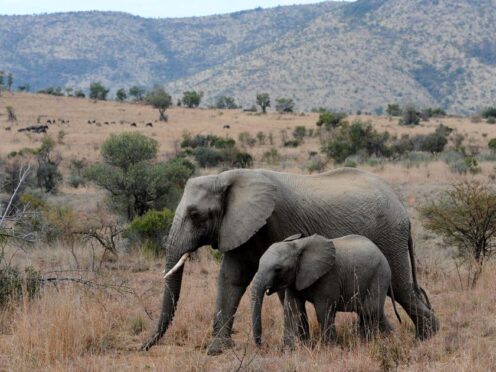
A proposed ban on trophy hunting imports has moved closer to becoming law, amid claims the reform risks being “racist” and a “step towards neo-colonialism”.
MPs voted 49 to zero, majority 49, to approve the revived Hunting Trophies (Import Prohibition) Bill at second reading on Friday.
The Bill, sponsored by Labour former minister John Spellar and supported by the Government, would ban the import of hunting trophies from species of conservation concern into Great Britain.
But critics of the import ban have argued it ignores the concerns and conservation expertise of African countries and lacks scientific credibility.
A similar Bill was blocked by a group of peers in the last parliamentary session, despite clearing the Commons.
Mr Spellar (Warley) said there is an “overwhelming majority” of MPs and members of the public in favour of prohibiting the import of bodies of animals killed for sport.
He told the Commons: “This is an issue that runs across parties, across classes, across regions.
“This is a universal view across the country that they want this country to have no part in this vile trade.”
A House of Lords briefing paper last year stated 190 hunting trophies from Convention on International Trade in Endangered Species of Wild Flora and Fauna (Cites) listed species were imported into the UK in 2020.
Conservative MP Henry Smith (Crawley), who sponsored the previous Bill blocked by the Lords, said of trophy hunting: “It is not a natural practice of people in southern Africa, this is a neo-colonial import that was brought to that continent during the time of colonialisation and is not something that is native.”
Mr Smith added: “It’s not unique to Africa. There have been some claims that somehow this is some racist legislation, this is telling countries around the world how to act and how to conduct their own hunting policy.
“Let’s just remind ourselves that this is a piece of import legislation. This legislation is saying we in this country by a clear majority choose not to want to allow the importation of body parts of endangered species slaughtered and killed by hunters into Great Britain; that is the territorial extent of this Bill, that is what it is designed to do.”
Conservative MP Sir Bill Wiggin (North Herefordshire) said he wants to amend the Bill to “take any risk of racism away” from it.
He said people should consider what African representatives have said about the proposals, telling the Commons: “I don’t believe anybody in this House intends to be racist but this Bill crosses the line.
“The Namibian environment minister Pohamba Shifeta has written to our Environment Secretary denouncing the Bill as a regressive step towards neo-colonialism, ‘Your Bill implies that your judgments supersede our insights and expertise’.”
Labour MP Peter Dowd (Bootle), intervening, said: “I’m not telling them or demanding how they manage their wildlife. What I’m saying, and I think many Members of this House are saying, is we don’t want those disgusting trophies in this country. Simple.”
Sir Bill replied: “The African countries find it appalling that British politicians show no concern for African lives threatened by these animals, they are furious with the virtue-signalling proposals which lack scientific credibility and again and again and again they return with the facts and they’re completely ignored by honourable members in this debate.”
Sir Bill said his planned amendment would ensure the Bill protects certain species whilst recognising other countries are better at managing conservation, noting: “It would allow the Secretary of State to add or withdraw countries from a list of countries that issue hunting licences and show sufficient levels of concerns for conservation.
“Any hunting trophy obtained under licence in a country that is on the list would be exempt from the ban.”
Labour MP Clive Efford (Eltham) said the Bill does not just relate to African countries, saying: “I’ve not heard anyone say we’re being racist to Canadians by not wanting polar bears to be imported.”
Conservative former minister Tim Loughton joked he wanted to make a practical offer to peers who are minded to try and “sabotage” it again.
He said: “I speak as chairman of the all-party parliamentary group for photography. We will have a special category in the exhibition this year for wildlife photos so they can show how brave and manly they are by getting up close with cameras rather than guns.”
Environment minister Rebecca Pow said the Government will support the Bill to ensure trophy hunters from the UK “are not putting additional pressure on already threatened species”.
She said: “That is what should concentrate our minds and that is why I am pleased to confirm the Government will be supporting this Bill, and in doing so we will signal our continued determination to fulfil our manifesto commitment in this regard.”
The Bill will undergo further scrutiny at a later date and faces a race against time to clear all the necessary parliamentary stages before the next general election.
Claire Bass, senior director of campaigns and public affairs at Humane Society International/UK, said: “We are a step closer to stopping British trophy hunters shipping body parts of endangered animals back to the UK as sick souvenirs.”
Professor Amy Dickman, director of the Wildlife Conservation Research Unit at Oxford University, said the parliamentary debate was “riddled with misinformation”.
She added: MPs pushing for a blanket import ban demonstrated that they were willing to ignore scientific evidence, major risks to conservation and animal welfare, and the rights and livelihoods of affected people.”

Enjoy the convenience of having The Sunday Post delivered as a digital ePaper straight to your smartphone, tablet or computer.
Subscribe for only £5.49 a month and enjoy all the benefits of the printed paper as a digital replica.
Subscribe